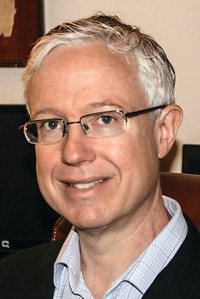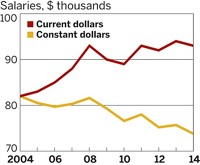Advertisement
Grab your lab coat. Let's get started
Welcome!
Welcome!
Create an account below to get 6 C&EN articles per month, receive newsletters and more - all free.
It seems this is your first time logging in online. Please enter the following information to continue.
As an ACS member you automatically get access to this site. All we need is few more details to create your reading experience.
Not you? Sign in with a different account.
Not you? Sign in with a different account.
ERROR 1
ERROR 1
ERROR 2
ERROR 2
ERROR 2
ERROR 2
ERROR 2
Password and Confirm password must match.
If you have an ACS member number, please enter it here so we can link this account to your membership. (optional)
ERROR 2
ACS values your privacy. By submitting your information, you are gaining access to C&EN and subscribing to our weekly newsletter. We use the information you provide to make your reading experience better, and we will never sell your data to third party members.
Careers
The Consulting Niche
Many are choosing risky but independent career path
by Rick Mullin
November 7, 2005
| A version of this story appeared in
Volume 83, Issue 45

Some chemists are born to be independent consultants. Many more have consulting thrust upon them because they get laid off. Still others retire and, preferring not to sit around the house, choose to try their hand at entrepreneurship. As a result, independent consulting in the chemical industry is a polyglot employment sector whose denizens' activities range from dabbling to clocking 60-hour workweeks and amassing scads of frequent-flyer miles.
A recent survey conducted by Chemical Consultants Network (CCN), an association of consultants in the Philadelphia area, indicates that the dabblers make up the bulk of the market in the key chemical and pharmaceutical region of eastern Pennsylvania, New Jersey, and Delaware. Of the 130 respondents to the survey (representing a quarter of the membership), 37% earn less than $10,000 per year, indicating that they have other sources of income-usually a pension, social security, a 401(k) plan, or a working spouse. This group, according to William C. Golton, one of the founders and the initial chairman of CCN, is composed largely of retirees.
This is not to say that all retirees who go into consulting are dabblers. Golton, for example, has his own consulting practice and is vice president of the Cecon Group, a firm that brokers consulting services in the chemical and pharmaceutical industries. His consulting activity follows 32 years at DuPont, working primarily in paint-related businesses, before he moved to DuPont-Merck, the pharmaceutical venture, in his last two years before retiring.
Golton sees his experience as typical of that of most executives who take a serious stab at consulting after 30 or more years in industry. For one thing, he spent his entire career working for one employer, a rarity in any industry since the early 1990s. He left DuPont taking an early-retirement package. Mathematically, the offer was too good to turn down, Golton says.
He also admits to striking out on his own rather naively at first. I started out asking myself, How do I write my rsum?' he says. I ended up writing six rsums, because I'd done so many different things at DuPont over the years. He finally focused on the skill that was transferable between paint and drugs at DuPont: analytical chemistry, specifically the implementation of laboratory information management systems.
Golton says niche expertise is critical to success for most consultants, because prospective clients are generally looking for experts to tackle narrowly defined projects. Consultants coming from a science job in industry must also develop marketing acumen. They must nurture skills that can be new and sometimes antithetical to the psyche of the scientist, he says. The day you go out on your own, you have to make a mental gearshift, he explains. You have to be part salesman.
Golton says chemists are generally ill-equipped to make this transition. I like to tell the joke that you can always tell an extroverted chemist or chemical engineer because they look at your shoes when they talk to you instead of looking at their own, he says. Science seems to attract introverts. And we have also been taught, those of us who went to graduate school, not to be self-promoting, not to blow your own horn. It's kind of hard to get out of that mind-set.
Marketing, Marketing, Marketing
The Career Consultants Network (CCN) has identified seven questions that all potential consultants should ask themselves–and then be prepared to answer them with yes.
1. Strength Analysis: Have you formally analyzed and defined, in writing, your marketable expertise, strengths, and weaknesses?
2. Benefit Analysis: Have you formally analyzed and defined, in writing, the benefits your clients realize when they hire you?
3. Direct and Indirect Competition: Have you formally analyzed, and defined, in writing, the direct and indirect alternatives your potential clients may have instead of hiring you?
4. 30-Second Statement: At this moment, could you recite a compelling 30-second statement describing why a potential client should hire you instead of using a direct or indirect competitor?
5. Customer Objections: Do you have a list of customer objections or excuses that potential clients use when they say they do not need your consulting services?
6. Overcoming Customer Objections: Do you have a list of prethought responses to your top five customer -objections?
7. Segmentation: Have you formally defined, in writing, the market segments that are most likely to use your consulting services?
According to the 2005 CCN survey- of its members, for consultants whose annual revenue was less than $10,000 per year, the average number of yes responses was 1.9 (out of 32 responses). For consultants making more than $100,000 per year, the average number of yes responses was 3.6 (24 -responses).
Not everyone has that problem. Mark E. Halpern, president of PTC Organics, is a forceful promoter who has turned his niche expertise in phase-transfer catalysis into multiple businesses in consulting and process development. Beginning with a book and a newsletter, published while he still had a full-time job in industry, Halpern says he has established himself as a recognized expert on the technology.
Halpern worked at Dow Chemical and ICI Polyurethanes before taking the position of director of research for ion-exchange resins and toner polymers at Sybron Chemicals in 1990. There he began working on catalysts for phase-transfer catalysis. He left Sybron to start a phase-transfer catalysis business in the U.S. for an Indian firm, a venture that did not pan out.
I remember thinking at the Informex trade show in 1996 that I had a choice, Halpern says. Get a real job or start a business. He says he had a job offer at the time, but he opted to go it alone. I really wanted to consult, he says. I loved working in industry, but I had the bug for being an entrepreneur. He also had a passion for what looked to be a potential hot niche: Phase-transfer catalysis had been a passion since I saw it in 1976. I still have that passion. That passion is really important.
At the core of Halpern's consulting business is a mailing list of 3,500 chemists, process engineers, and others who might employ phase-transfer catalysis. The consulting business reached $200,000 in annual revenue in three years, he says. In 1999, Halpern formed PTC Organics, a process development firm, and cofounded Value Recovery, a firm that develops environmental management applications for the technology. Halpern also launched PTC Communications, which publishes a newsletter called Industrial Phase-Transfer Catalysis.
Halpern says phase-transfer catalysis process development has been a fairly lucrative field, given the focus on process efficiency, which has only increased in some parts of the chemical industry with the ramp-up of Asian competition. Halpern claims that for about one-third of his clients, he has been able to develop processes that cut manufacturing costs by 15%, which can translate into doubled profits. He saw a drop-off in business last year, but investments in process efficiency improvements are rebounding in 2005, according to Halpern.
Halpern, who was 41 when he began consulting, says a young chemist leaving the security of full-time work to consult needs more than niche expertise. He or she also needs to thoroughly prepare, ideally getting the new business off the ground before severing ties with an employer. I wrote a book three years before I left, he says. I published a newsletter and built a database. I took courses at Wharton on my own dime. If someone is going to be a consultant at age 40, they had better prepare.
The fledgling consultant's passion for technology should also be matched by a passion for marketing, Halpern says. He agrees with Golton that a passion for both is a rare phenomenon. Marketing, however, can be learned, Halpern says-if you can solve complex chemical problems, marketing is easy. As with chemistry, he says, marketing is a matter of knowing the right questions to ask.
Mark DeLuca, a chemical engineer, left industry to consult at the age of 32 after working at Rohm and Haas, Perkin Elmer, and Chessel Chart Recorder. The niche he staked out with his manufacturing information technology (IT) background-systems validation for pharmaceutical plants-keeps him busy, he says, and keeps him on the road.
That's one of the downsides to what I do, DeLuca says. I've worked in West Virginia, Massachusetts, New Jersey, Delaware, Wisconsin, Ohio, Indiana. Especially during the lean times, you get on the plane on Monday morning and get home at 10 Friday night. Lately, he says, he has been working on a contract with Bristol-Myers Squibb in New Brunswick, N.J., which is within driving distance from where he lives in Pennsylvania.
The requirement for third-party systems validation generates a lot of work in pharmaceuticals, DeLuca comments. In general, independent IT consulting has been a growing field. I don't know if companies want a lot of IT people on the payroll, he says. It used to be a status symbol. If you had a million employees, you must be a great company. Now, stockholders think that if you cut a lot of jobs, you must be a great company. Either way, companies still have to get the same amount of work done.
DeLuca emphasizes the importance of face-to-face networking. Word-of-mouth referrals ranked highest in the CCN survey as the typical source of leads on consulting jobs-averaging nearly three on a scale of one to four. Strategic alliances and Internet advertising, the second and third most useful source of leads, according to the survey, averaged about 1.5 on the same scale.
CCN, which was started by the American Chemical Society's Philadelphia Section and is now cosponsored by the American Institute of Chemical Engineers, is an important organization for networking purposes, according to DeLuca. There is the social aspect, he says. We get together, have a dinner, and talk: So and so has a project and needs more people. Are you free?' We network with each other. He says a job at Wyeth in Massachusetts recently required more work than initially projected, and additional consultants were gathered at a CCN dinner. All traveled to Massachusetts.
DeLuca says the group's reputation has spread, and there have been inquiries from around the world about how to get access to the network. People from India and even Iraq ask us how we do it, he says. I tell them you have to find a local friend. You can't come to Philadelphia on a Wednesday night and have dinner with us for the hell of it. Even in the flat world of Internet-based business, effective networking for consultants grows from old-fashioned personal contact, DeLuca says. You lose that when you want to deal with somebody in Turkey.
DeLuca cautions that the loss of job security is a major consideration in deciding whether to strike out as an independent consultant. If you are counting on getting paychecks to pay the mortgage and take care of family needs, or if you spend every dime that you make, this is not the business to be in, he says. DeLuca says he compares incomes with four friends from college who have full-time jobs that pay less than he is paid when he is working. Basically, he says, his annual income is comparable with theirs.
Golton says he cannot broadly recommend consulting as a career choice. Don't go into it if it is to put food on the table, he says. It is not the kind of income you are going to get as a full-time employee for a big company. It is, however, a very good occupation if you have other sources of income, Golton says. You feel like you're contributing something-your expertise and know-how, he says. That feeling, according to Golton, is the consultant's raison d'tre. At some point, I'll get to the point where I don't feel confident in my ability to consult, he says. Then I really will be retired.





Join the conversation
Contact the reporter
Submit a Letter to the Editor for publication
Engage with us on Twitter